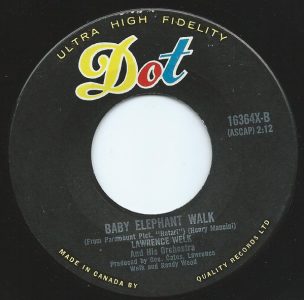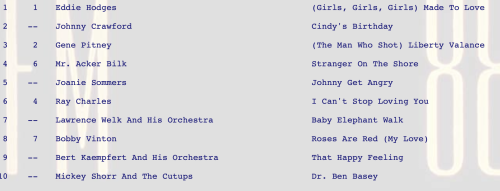#50: Baby Elephant Walk by Lawrence Welk
City: Calgary, AB
Radio Station: CFAC
Peak Month: June 1962
Peak Position in Calgary ~ #7
Peak position in Vancouver ~ #22
Peak Position on Billboard Hot 100 ~ #48
YouTube: “Baby Elephant Walk”
Lawrence Welk was born in 1903 in the hamlet of Strasburg, North Dakota. His German-speaking parents emigrated to American from Odessa, Russian Empire (now Ukraine). The Welk family lived in a homestead in Strasburg that is now a tourist attraction. When he was nine years old, Lawrence Welk left public school to work full-time on the family farm. Welk decided on a career in music and persuaded his father to buy a mail-order accordion for $400 (equivalent to $5,843 in 2023). He promised his father that he would work on the farm until he was 21, in repayment for the accordion. He was good on his word and after reaching age 21, he set his sights on a music career.
After a tedious grind of playing one-night stands with pickup bands, Welk formed a three-piece “Biggest Little Band in America” to help inaugurate radio station WNAX in Yankton, South Dakota. In the 1920s, in the Dakotas’, Welk was a band leader variously for the Hotsy Totsy Boys and the Honolulu Fruit Gum Orchestra. The Lawrence Welk Orchestra scored an immediate success and began a daily radio show, which lasted from 1927 to 1936.
Over the years, Welk developed the style that would make him famous: bouncing, effervescent, with a steady beat that invited dancing. He found the name for it—“champagne music”—while broadcasting from the William Penn Hotel in Pittsburgh in 1938.
Welk’s big band performed across the country, but particularly in the Chicago and Milwaukee areas. In the early 1940s, the band began a 10-year stint at the Trianon Ballroom in Chicago, regularly drawing crowds of several thousand. His orchestra also performed frequently at the Roosevelt Hotel in New York City during the late 1940s.
The Welk band continued playing in some of the biggest hotels and ballrooms across the country before appearing on Los Angeles TV in 1951 with The Lawrence Welk Show. The show was recorded at the Aragon Ballroom in Venice Beach, California. High ratings led to a summer replacement show two years later on ABC. In 1955 The Lawrence Welk Show debuted for national syndication on ABC.
As a recording artist, Lawrence Welk began to record in 1928. But it was in 1938 that “Colorado Sunset” became a national hit, peaking at #17 on the Billboard pop chart. It was one of four singles to crack the Top 20, with “I Won’t Tell A Soul” peaking at #8. He repeated his success with single 78RPM releases, with “The Moon Is A Silver Dollar” climbing to #7.
In the 1940s, Lawrence Welk’s biggest hit was in 1944 with “Don’t You Sweetheart Me”, a #2 smash hit. While in the 1950s, both “Oh Happy Day” and “Tonight You Belong To Me” (the latter with the Lennon Sisters) peaked at #3 on the Cashbox Top 100 Singles chart in 1953 and 1956 respectively.
In 1961, Welk had his only number-one hit with the instrumental “Calcutta”. He also scored a minor hit with the theme song for the TV show “My Three Sons”. As well his cover of “Yellow Bird” offered up another piece of champagne music for those wanting a break from rock ‘n roll in 1961. The instrumental peaked at #2 in Calgary, and #5 in Winnipeg and Toronto.
In early 1962, Lawrence Welk released an instrumental cover of the No.1 Del Shannon hit “Runaway”. Next up, Lawrence Welk recorded a version of “Baby Elephant Walk”.

“Baby Elephant Walk” was written by Henry Mancini. It was composed for an impromptu scene in the movie Hatari! in which ‘Dallas’ (Elsa Martinelli) led three baby elephants to a waterhole to bathe. The catchy simplicity has made it one of Mancini’s most popular works, appearing on many compilation albums. Hal David composed lyrics for it, which were not used for the film but appear in the printed sheet music. Pat Boone used the lyrics in his recording released by Dot Records in 1965. The first verse invited listeners to:
Make believe you’re in a jungle movie.
Watch the baby elephants go by.
The beat is groovy.
It’s a brand new dance you ought to try.
Come to the jungle, and see the animal attraction,
Baby elephant in action walk.
Boone’s vocal recording of “Baby Elephant Walk” was not a hit. By 1965, in the height of the British Invasion with “(I Can’t Get No) Satisfaction” by the Rolling Stones topping the pop chart, Pat Boone’s “Baby Elephant Walk” was considered ‘square.’ Henry Mancini’s version of “Baby Elephant Walk” was not released as a single.
Due to its “goofy” sound, “Baby Elephant Walk” is often used in a humorous context. As the allmusic.com album review states, “if Hatari! is memorable for anything, it’s for the incredibly goofy ‘Baby Elephant Walk,’ which has gone on to be musical shorthand for kookiness of any stripe. Get this tune in your head and it sticks.”
The overall style of “Baby Elephant Walk” is that of boogie-woogie, as Henry Mancini explained:
I looked at the scene several times [and] I thought, ‘Yeah, they’re walking eight to the bar’, and that brought something to mind, an old Will Bradley boogie-woogie number called ‘Down the Road a Piece’ … Those little elephants were definitely walking boogie-woogie, eight to the bar. I wrote ‘Baby Elephant Walk’ as a result.
Enrico Nicola Mancini was born in Maple Heights, Ohio, in 1924. Both his parents were Italian immigrants to the USA. At age eight Enrico learned to play the piccolo. He later studied at the Juilliard School of Music. When he turned 18 he enlisted in the United States Army he met Glenn Miller at basic training. Owing to a recommendation by Miller, Mancini was first assigned to the 28th Air Force Band before being reassigned overseas to the 1306th Engineers Brigade in France. In 1945, he helped liberate the Mauthausen-Gusen concentration camp in Austria. In 1946, he became a pianist and arranger for the newly re-formed Glenn Miller Orchestra, led by ‘Everyman’ Tex Beneke. (Glenn Miller was declared missing in action after his plane disappeared over the English Channel in December 1944). In 1952, Henry Mancini joined Universal Studios’ Universal-International music department. In 1952 he scored music for The Raiders, and in 1953 for The Glenn Miller Story. ‘
These were the first few of a hundred films Mancini scored music for. Notable among these films are The Benny Goodman Story, Mr. Hobbs Takes A Vacation, Charade, The Great Race, The Molly Maguires, That’s Entertainment, The Return of the Pink Panther, The Return of the Pink Panther, The Pink Panther Strikes Again, The Prisoner of Zenda, That’s Dancing and many more. In 1958, Mancini left Universal to become an independent composer/arranger.
In 1959, Henry Mancini won two Grammy Awards for The Music from Peter Gunn. The first was for Album of the Year and the second was for Best Arrangement. Mancini wrote the theme music for the popular TV adventure-drama series Mr. Lucky, which aired in the 1959-60 season. In 1961, Mancini won two Academy Awards, one for “Moon River” for Best Original Song and one for Best Scoring of a Dramatic or Comedy Picture for the movie Breakfast at Tiffany’s. Mancini’s instrumental “Moon River” climbed to #11 on the Billboard Hot 100. In 1962, he won Best Original Song again, this time for “Days of Wine and Roses”. In 1964, Henry Mancini’s “A Shot In The Dark”, the theme track for the sequel to the Pink Panther, was a Top 20 hit in Vancouver.
Mancini was nominated for 72 Grammy Awards and won 20. He was nominated for 18 Academy Awards and won four.
“Baby Elephant Walk” peaked at #1 in Oklahoma City, #4 in Redding, CA, #7 in Calgary, and Indianapolis, IN, #8 in Corpus Christi, TX, Saint Joseph, MO, and Kansas City, MO, #9 in San Diego, and Idaho Falls, ID, and #10 in Los Angeles, Shreveport, LA, and Bakersfield, CA.
A version by the Miniature Men peaked at #13 in San Antonio (TX), #15 in Dallas, and #17 in Toronto. While Kai Winding has a version of the tune that peaked in Sarasota (FL) at #16.
In 1963, the single “Scarlett O’Hara” was a Top 20 hit in Toronto for Lawrence Welk. Into the mid-60s, Lawrence Welk struggled to crack the Billboard Hot 100. His largely instrumental cover of the Sonny & Cher single “The Beat Goes On” stalled at #104 in 1967. His last single to crack the Top 30 on the Adult Contemporary chart in the USA was in 1968 with
“Green Tambourine”.
Over the decades, Welk became, after Bob Hope, the second-wealthiest performer in show business, and his band and production company became the second-biggest tourist draw of Los Angeles, right behind Disneyland.
“The Lawrence Welk Show” ended on Feb. 25, 1982, after 1,542 performances. He died in 1992 at the age of 89.
December 9, 2023
Ray McGinnis
References:
“It was a ‘Wunnerful’ life,” Grand Forks Herald, Grand Forks, ND, May 19, 1992.
Lloyd Shearer, “Lawrence Welk: The King of Musical Corn,” Parade, November 15, 1970.
Lawrence Welk and Bernice McGeehan, You’re Never Too Young, (Prentice-Hall, 1981).
John Caps, Henry Mancini: Reinventing Film Music, (University of Illinois, 2012).
Richard Severo, “Henry Mancini dies at 70, Composer for films and TV,” New York Times, June 15, 1994.
“Berklee honors late Henry Mancini,” Associated Press, May 12, 1997.

CFAC 960-AM Calgary (AB) Top Ten | June 23, 1962

Yet another superb write up. Baby Elephant Walk sure does stay in your head when you hear it. Growing up in Toronto, I liked Scarlett O’Hara as well which made it to #17 on the CHUM chart and #89 on the Billboard Hot 100 (for 2 weeks).